Why Kids are Key for A Strong Downtown
Emma Sullivan, May 23, 2018
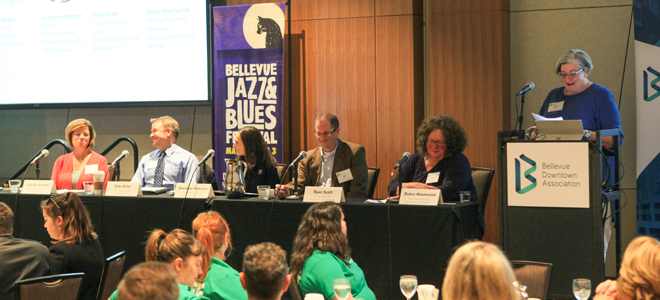 As Downtown Bellevue grows, kids and their families will continue to play a big role in the design and health of our community and economy. What’s at stake and how can we help build an even stronger downtown for all? How are our kid-focused spaces, businesses and programs attracting jobs and visitors and giving us a competitive edge? Yesterday morning at our May BDA Breakfast, our expert panel led the discussion and explored links between business, kids and building amazing places to play, learn and grow up.
As Downtown Bellevue grows, kids and their families will continue to play a big role in the design and health of our community and economy. What’s at stake and how can we help build an even stronger downtown for all? How are our kid-focused spaces, businesses and programs attracting jobs and visitors and giving us a competitive edge? Yesterday morning at our May BDA Breakfast, our expert panel led the discussion and explored links between business, kids and building amazing places to play, learn and grow up.
A special thank you to our wonderful moderator & panelists:
Featured Panelists
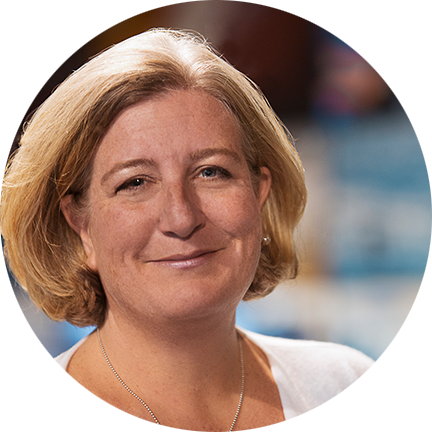
Putter Bert, President/ CEO (Moderator)
KidsQuest Children’s Museum
A hands-on, interactive children’s museum, KidsQuest encourages learning through play with an emphasis on science, technology, engineering, art, and math (STEAM). KidsQuest offers over 200 unique programs throughout the year including early learning classes, summer camps, school age workshops, free art and science programs, and many special events including holiday programs. KidsQuest has been an Eastside institution since 2005 and a Downtown destination for families since 2017.
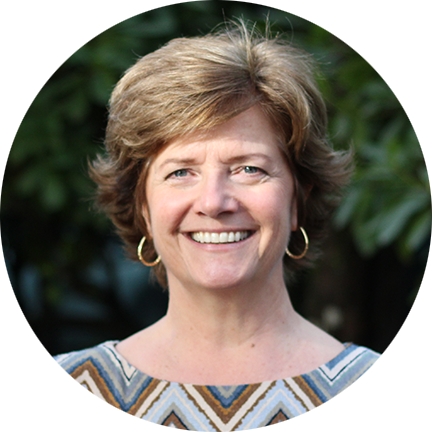
Judy Buckmaster, Executive Director of Student Services
Bellevue School District
Downtown area growth has led the Bellevue School District to bring us a brand new elementary school. Wilburton Elementary is currently under construction and slated to open to students in Fall 2018 - it will be the School District's 18th elementary school. We’ll hear from the School District on some of the trends, needs and opportunities our community is experiencing.
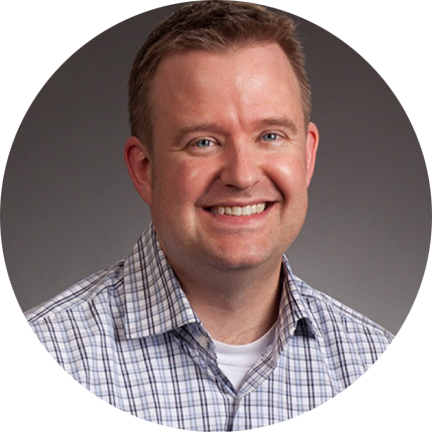
Pete Miller, CPA, CFE, Shareholder
Clark Nuber PS
Clark Nuber is an award-winning CPA and consulting firm located in Downtown Bellevue. For over 65 years, Clark Nuber has provided sophisticated accounting and consulting services to clients here in the Pacific Northwest and throughout the world. In a competitive industry for top talent, Clark Nuber has valued employees and their families from the very beginning. As the company has grown, so too have the number of employees with families of their own. The company’s relatively high retention rate shows their employee policies are working.
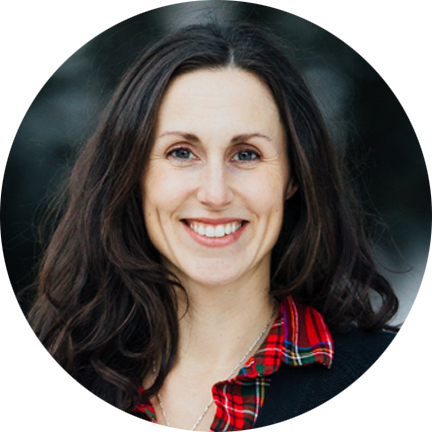
Shannon Peterson, Owner, Head of School
Primrose School of West Bellevue
Opening Summer 2018 near Downtown Bellevue, the Primrose School is part of a national system of accredited private preschools that provides a premier early education and child care experience for children and families. Franchise Owners, Leadership Teams and School Staff partner with parents to help build the right foundation for future learning and in life.
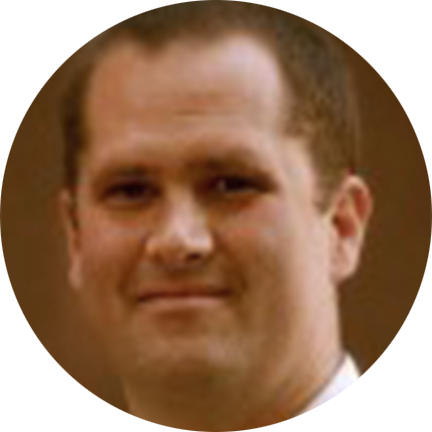
Ryan Scott, Vice President/ COD
Boys & Girls Club of Bellevue
Boys & Girls Clubs of Bellevue was founded in 1952 with one Clubhouse in Downtown Bellevue. Since its inception the Club has provided the young people of our community with something they need and want most: a safe environment where adults respect and listen to them; a place where they can have fun. There are currently 12 sites within the City of Bellevue including the Main Clubhouse in downtown Bellevue, 3 in Public Housing Sites, 4 in elementary schools, and 2 dedicated Teen Centers.
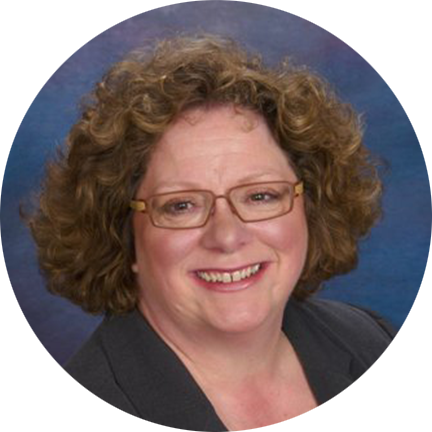
Debra Westwood, Library Regional Manager
King County Library System
The King County Library System's strategic focus is to create opportunities through meaningful connections – individuals at all stages of life, families, communities and organizations – with:
- Information and services to navigate life’s complexities and biases.
- Equitable avenues to build the skills and knowledge needed for success.
- One another to bridge differences and create communities of inclusion and belonging.
Interested in learning more? Read on!
We asked our panel a series of questions about the links between business, kids, and building amazing places to play, learn, and grow up. Below is a quick recap of the questions asked and the responses given by our panelists. (Not every panelist answered every question).
Question 1:
Across the country, cities are experiencing an urban renaissance. People want to live and grow in Downtown urban cores. What are the common themes that you have observed, that demonstrate families are an integral part of thriving modern day downtown?
Judy: "When I am out and about, what I see are families. We have become an urban center where people are walking all over and families are out and about whether it be at parks, the cinema, or more. It is important that families are able to interact with themselves and other families in spaces that are safe and welcoming to all."
Ryan: "There has been a transformation of Downtown Bellevue – we are seeing more and more foot traffic and we are working to keep up with the demand."
Question 2:
What do Downtown families look like today? What are kids wrestling with? How does it look different compared to 5 or 10 years ago? What is top of mind?
Debra: "Families are intergenerational – grandparents, parents, and kids are all involved. Families are also multilingual – with varying degrees of fluency even between generations. This presents an opportunity: some of the questions we focus on are 'how do we reach out to people?' 'What is the best method?' Kids are also much more fluent in technology than their parents – they are very digitally savvy."
Pete: "The diversity of the population within Bellevue – in all its different manifestations – is much different than it was 10 years ago. This is an incredible asset to Bellevue but also means that we have to understand what needs our diverse group of employees has and how to meet them."
Shannon: "5 years ago, when I was pregnant, I couldn't get my daughter in to infant toddler programs anywhere – there was a severe lack of availability. Now starting my own childcare/education franchise, I’ve found that it’s important to stress development socially and emotionally especially in a world where technology is so dominant. Character development and social/emotional intelligence are more important now than ever – it is the best predictor of success in a child’s life across life, love, and work. We hear many of our families saying they want to move to Bellevue specifically – not Seattle, but Bellevue – and we need to rise to meet their needs."
Question 3:
Can you talk about the Best Start for Kids Grant and the power of (BDA Member) Eastside Pathways and the grants that come out of it?
Judy: "Eastside Pathways is a group of individuals who operate with a collective impact frame of mind – social issues are becoming more and more complex and it takes all of us working together to address those issues. The diversity moving into the area is our strength, but it is also a challenge that we are embracing. The Bellevue School District currently has students from 120 birth countries and over 96 languages in the student population. Diversity isn’t coming, diversity is here. We’re not planning for the future, we are operating with what is here now. How do we as adults supporting the kids in our community come together."
Ryan: "Through Eastside Pathways, there is a next level partnership with the Bellevue School District, with the YMCA, with the City, with KidsQuest and collectively we are trying to serve a demographic with really serious challenges. We know of about 250+ families in Bellevue that identify as homeless…and that’s that we know about. This number comes as a contradiction to what people often see and think about Bellevue but the reality is that they’re there; quite a few of these are in the Downtown core. The solution to this issue must be through a collective effort."
Putter: "Homelessness is a really tricky issue because people just see it as 'tent cities' and it’s not just that. It is living in your car, it is 14 people living in a single apartment, it is couch surfing, it is not the stereotypical 'under the freeway.' It means lacking a fixed residence."
Question 4:
In regards to company culture and working parents; how do you support working parents in the Downtown area?
Pete: "It starts with being dedicated to the successes of your people – both professionally and personally. One of our core tenets in living up to this is providing flexibility to our employees. It starts with providing technology so they can get their work done anywhere or any time, so that they can go to the soccer games, or the dance recital, or the doctor’s appointments. Not only do we give our employees the tools to be able to do that, but we actively encourage them to take advantage of them."
Debra: "From the library’s perspective, we are open 7 days a week – often until 8 or 9 p.m. Anyone who works 20+ hours a week is fully benefited. This allows our employees not to have to worry about issues such as healthcare. We also have a flexible schedule process which will take into account employees’ availability and preferences to build their own schedule according to their needs."
Question 5:
20 years ago, there were not many families Downtown. Now there are over 14,000 residents. With such growth comes growing pains. What do we need? What’s not working? What does that look like?
Judy: "The Bellevue School District is about to open Elementary 18 which will help alleviate some of the overcrowding and growth that’s happening in the Enatai/Wilburton area (opens fall 2018 across from the Botanical Garden). We already have property for Elementary 19, so we are already anticipating increasing growth. As far as addressing the growth, public transportation, walkability, safety, and affordability of housing are key issues for our families in Downtown. In regards to affordability, in the public/nonprofit industry, we have a huge turnover of people because they are unable to afford to live where they are working. At the same time, we need to fill those teaching and support positions."
Pete: "Traffic, infrastructure, and housing are all issues that are relevant. Whether they live here or not, the Downtown core is a huge part of the lives of the many young families who work for us. The idea of working families being able to visit their kids during the day at daycare facilities available Downtown is so appealing. It leads into the idea of a family-driven Downtown that is so appealing."
Shannon: "We are recruiting for our teachers right now – what we’re finding in terms of recruiting is that you aren’t going to find a lot of teachers living in the Downtown Bellevue area that can afford the teacher’s hourly median salaries. We are offering really competitive benefits – medical, free gym memberships, and more – and yet we will still be asking teachers to drive from as far as Arlington, Renton, and Tacoma. All these people are coming to us because they know Downtown Bellevue is a wonderful place to work and has a great culture, but there are several challenges as an employer. How do you deal with long commutes? How do you deal with the one day where there’s a car accident on the freeway and a teacher can’t get in from Tacoma? The children are still going to come in but the teachers will be stuck in traffic.
On top of this, a lot of families we are marketing to are coming from out of area, where the cost of living is much lower. Their eyes are popping out of their sockets when they see what costs of housing are in Bellevue, so parents are choosing to move to places like North Bend, while still working in Bellevue, and we have to accommodate these families too."
Question 6:
What are some of the myths and preconceptions that people have about Downtown Bellevue?
Ryan: The Boys & Girls Club of Bellevue has been in Bellevue since 1952, has 14 clubhouses, and serves over 11,000 kids a year in Bellevue. There are a lot of myths about Bellevue – one of the biggest myths that we fight as an organization is that everyone thinks that 'everything’s fine in Bellevue,' that 'money is flowing in the streets,' but last year we gave a way over $1 million in scholarships – and a big part of that need comes from the Downtown core. That million dollar number really speaks to me because while things are going great, and we have a strong economy, there are so many other challenges that we have to be aggressive in addressing: dual income households, cost of living, etc."
Debra: "Building off of that, a lot of families are sacrificing certain things in order to live and work in Downtown Bellevue. One of the great things that the City offers is lots of free parks and public spaces. Having those kinds of public amenities are important to families in the area because they maybe looking for ways to spend their time that won’t cost them a lot of money."
Question 7:
We have a lot of business and community leaders sitting in front of us today. What do we want from them? How can we speak directly to them and get some change that focuses on our youngest citizens?
Ryan: "One of the things that comes up regularly is 'how do we prepare our kids to be productive members of the workforce?' I would highly recommend investing in and spending time on workforce development training - how do you have the skills and talents necessary to be successful in real world? This engagement needs to start at a very early level."
Putter: "The museum hires at age 15 and I will say that being the first work place for a young adult is really a privilege for the museum. I really encourage you all to take that risk."
Judy: "Even before that first workplace, a job shadow is helpful. Give a young person the opportunity to see what you do… what it looks like. Unpaid internships are great ways to see what it’s like to work in an industry and many of our students don’t have that opportunity or the connections that some other kids have. My other wishlists for Downtown Bellevue: a public open-air pool for the city, easy walking access to our beaches and parks, more support for and access to the arts."
Pete: "My son is really interested in the digital and technical world and I’m really glad that we have a school district that supports that. At the same time, there’s the important notion that you need to be a good, well-rounded employee . As a company we spend a lot of energy in trying to understand how millennials and the generation after them like to work – the skills they bring to the table. Meeting them halfway, and embracing that change, is an opportunity where we can make 1+1=3."
Shannon: "By 2050, 70% of humanity will move towards urban centers. At the same time, cities show the highest statistics for mood disorders. We must consider how we can combat that with more outdoor spaces and architectural projects that bring the outside in."
Debra: "Partnership has come up over and over in this dialogue – partnerships are a way for all of us to extend our reach strategically. If you have an idea, start by reaching out to the available resources because we are all interested in serving the full spectrum of our population. Explore the possibilities even if you don’t see an immediate solution."
Audience Questions:
Deputy Mayor Lynne Robinson: "Two Questions: How can we induce kids/families to bike/walk to school? How can we make it so that we have no homeless children in the BSD?"
Judy: "I think we can do it. I believe wholeheartedly that there is no reason why this community, if we were organized, could not end homelessness in this city. If not here, then where? We have the resources, we have the heart. We just need to organize and focus."
Putter: "The City is also trying out bike lanes in the Demonstration Bike way along NE 108th. (Learn more). This a great way to start activating bike lanes in Downtown."
Ms. Maxwell: "How can we make sure that our kids’ voices are heard?"
Ryan: "The dialogue with young people is critically important. In some cases, forcing the dialogue is necessary – you have to be diligent about continuing the conversation. If you continue to do it, then you lay the groundwork for it to become commonplace."
Debra: "It’s important to start with the acknowledgement that children are part of our constituency. For some of our organizations that have advisory boards: Do you have student representatives? Are you inviting those voices to the table? At the library we have teen advisory boards to help us decide what kinds of programs to offer. These models are out there and really doable."
Putter: "If you are going to ask them for their thoughts, you have to listen. You have to listen to understand and not to respond. We need to learn how to listen to our children."





